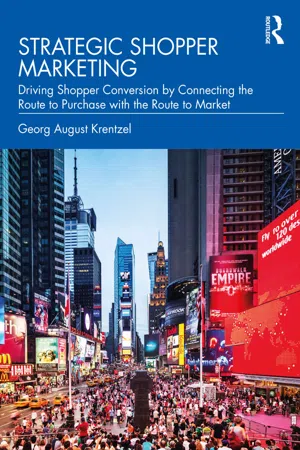Economic development has lifted millions of people out of poverty in emerging and developing economies, and has turned developed economies from markets of scarcity into markets of oversupply. Industrialization has made more and cheaper products available. Combined with more free time and access to cheaper money, shopping has turned from a necessity into a mass and leisure activity. Shopping is today a key engine of the economy. Infrastructural and technological development have profoundly changed the way we shop through improved availability and reach of products and services, and have made the management of shoppers, retailers, distributors and other partners more complex.
Successful shopper marketing strategies are dependent on a good understanding of the economic, sociopolitical, and technological environment. The development of this environment has a direct influence on shoppers and their behavior in terms of omnichannel shopping, segmentation and personalization, and values.
The relevance of shopper marketing
Private consumption is an important engine of the economy. With the ending of the gold standard and the Bretton Woods system in the seventies, the amount of money, as well as credits, that were available in the marketplace multiplied exponentially. In the 1980s, during the era of the new conservatism led in the United States by Ronald Reagan and in the United Kingdom by Margaret Thatcher, political decisions with important implications on the economy were taken. The ideas had academic support from the liberal theories of free market economics from the University of Chicago that were critical to demand-side economics and Keynesianism. Among the academics who gave theoretical support for that political development were Milton Friedman with his theory of monetarism (Nobel Prize winner in 1976)1; George Stigler with his description of how lobbying formed economic policy in its favor (Nobel Prize winner in 1982)2; Gary Becker, describing that rules of economics could also be applied to social situations outside the economy (Nobel Prize winner in 1992)3; or Robert Lucas who won the Nobel Prize in 1995 and was a strong critic of Keynesianism4; and other important academics such as Frank Knight, who is seen as one of the founders of the Chicago School and who showed the important role of the entrepreneur.5 The Chicago School of Economics was the driving force behind the famous Chicago Boys, the economists in the 1980s who had a major impact, first in Chile and then in other South American countries, on economic policy.6
The 1980s were the point at which the idea of the free market won against opposing political ideas, such as communism as well as many of the more socialist ideas in Western societies. Francis Fukuyama, in his famous article, even proclaimed the end of history, as with the collapse of the Soviet Union, the last ideological alternative to liberalism had been eliminated.7 From the communist bloc only North Korea really remains today. Other communist countries, such as China, have strong ingredients of market economics. Countries with strong socio-democratic traditions, like Sweden or Austria, started to introduce important privatization reforms in the 1980s, and more heavily in the 1990s, based on the conviction that the state can never distribute products or services as effectively as a functioning free market.
The idea of the benefits of free market forces, especially when it comes to efficient distribution of scarce resources, is increasingly coming under criticism when it comes to public services. In addition, with the growing income divide, globalization is under criticism,8 a criticism that is strongly associated with the economic crisis of 2008 and the real estate bubble that started in the United States with subprime products. Those who entered late into the real estate game had less potential value to gain and those with low incomes were the ones who lost the most, in relative terms. Today, we are in a situation of high debts, low inflation and growth in most Western societies, but also countries traditionally associated with...
